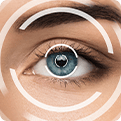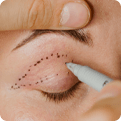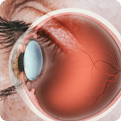
Implantable collamer lens surgery is a safe refractive procedure for correcting vision. Unlike alternative treatments like LASIK, the implantable collamer lens (ICL) doesn’t remove any corneal tissue. Instead, a thin lens is implanted into the eye behind the iris, and in front of the natural lens. For Newark-area patients considering their refractive surgery options, here are the main benefits of ICL surgery.
The Primary Benefits of an Implantable Collamer Lens
Individuals with myopia (nearsightedness) and astigmatism now have a range of effective treatment options. Here’s why the ICL might be the best choice for you.
Reversible Treatment
Unlike treatments like LASIK, ICL surgery is reversible. If a patient is not satisfied with the results or suffers complications, the surgeon can extract the ICL implant. However, while the treatment is reversible, most patients are satisfied with their vision, and the artificial lens will last throughout their life.
Clear Vision
The ICL procedure is a high-quality surgery delivering clear, sharp vision. For those used to the inconvenience of glasses or contact lenses, the treatment provides a dramatic difference. Refractive errors where ICL really benefits patients include severe nearsightedness.
Pioneering Vision Correction Technology
ICL surgery uses the latest in lens technology, ensuring clear vision and protection against harmful UV rays. At Eye Care of Delaware, we offer the EVO Visian ICL Lens, delivering significant vision improvements in just a 10 – 12 minute surgery.
Preserves Corneal Tissue
As ICL doesn’t involve reshaping or removing corneal tissue, the natural structure of the cornea remains intact. This factor is particularly beneficial for patients with thin corneas, and for those who might be at risk of developing issues from corneal thinning.
Fast Recovery
Recovery from ICL surgery is rapid, with most patients experiencing improved vision within the same or next day. Some patients may suffer mild discomfort for a few days, though issues are usually minor. For the final results, expect to wait around three to four weeks.
Convenience
For those who are frustrated with daily contact lenses, the convenience of ICL cannot be ignored. The artificial lens is implanted in the eye and doesn’t move, ensuring stable and consistent vision.
Reduced Risk of Dry Eyes
Dry eye syndrome is a concern for some patients undergoing refractive eye surgery. However, the likelihood of getting dry eyes with ICL is minimal. The reason for this reduced risk is that the surgery does not involve creating a corneal flap, or reshaping the surface of the eye.
Newark’s Leading ICL Treatment Specialists
Eye Care of Delaware provides safe and dependable ICL surgery for patients with refractive errors. If you’d like to find out more about our refractive surgery and vision correction solutions, contact our team today. Call (302) 454-8800 or request an appointment now.









